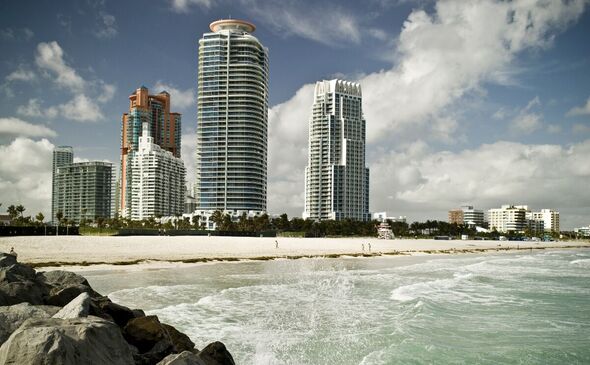Skyscrapers are among 35 buildings off Miami‘s mainland which have sunk as much as eight centimetres since 2016, research shows.
Experts at the University of Miami studied buildings along a strip of islands off the city, which is home to more than 450,000 people, and found 35 were affected by subsidence between two to eight centimetres.
Around half the sinking buildings were built after 2014, with researchers attributing the subsidence to construction activity.
Publication of the study comes after the Champlain South Condominium Tower in Surfside, Miami Beach, collapsed in 2021, killing 98 people.
That tower block’s collapse is attributed in the study to the deterioration of its reinforced concrete and design flaws, but the tragedy highlights the need to monitor building stability, according to the research.
Porsche Design Tower in Sunny Isles Beach is identified in the same study as having one of the greatest levels of subsidence, at almost eight centimetres since it was completed in 2016.
The research was conducted over seven years with the use of a monitoring device which can measure geological changes down to a millimetre.
Construction work has caused or sped up the deformation of sandy layers inside the limestone on which the buildings sit, leading to subsidence.
Researchers note in the study that while high rise buildings in south Florida are designed to withstand “settlement” up to tens of centimetres, differences in settlement rates between buildings can cause stresses which lead to structural damage.
The study concludes that there were no signs subsidence will end. Despite the uncertainty subsidence generates, rising sea levels resulting from climate change also pose a risk.
However, according to industry magazine, Dezeen, “massive” structures are still being built off Miami, including an 18-storey Aman tower block in Miami Beach.
A 12-storey, luxury condominium tower block has also been proposed based on designs by Zaha Hadid Architects.
Buildings in Miami’s offshore islands are not the first to be identified as sinking under their own weight, with a similar study showing Manhattan facing the same problem.
Separate research found the Big Apple is sinking at an average 1-2mm per year in part due to the sheer weight of its buildings.
It is not alone, with the World Economic Forum identifying Jakarta, Lagos, Houston, Dhaka and Venice among other cities in danger of disappearing as a result of rising sea levels or subsidence due to excessive groundwater extraction.
